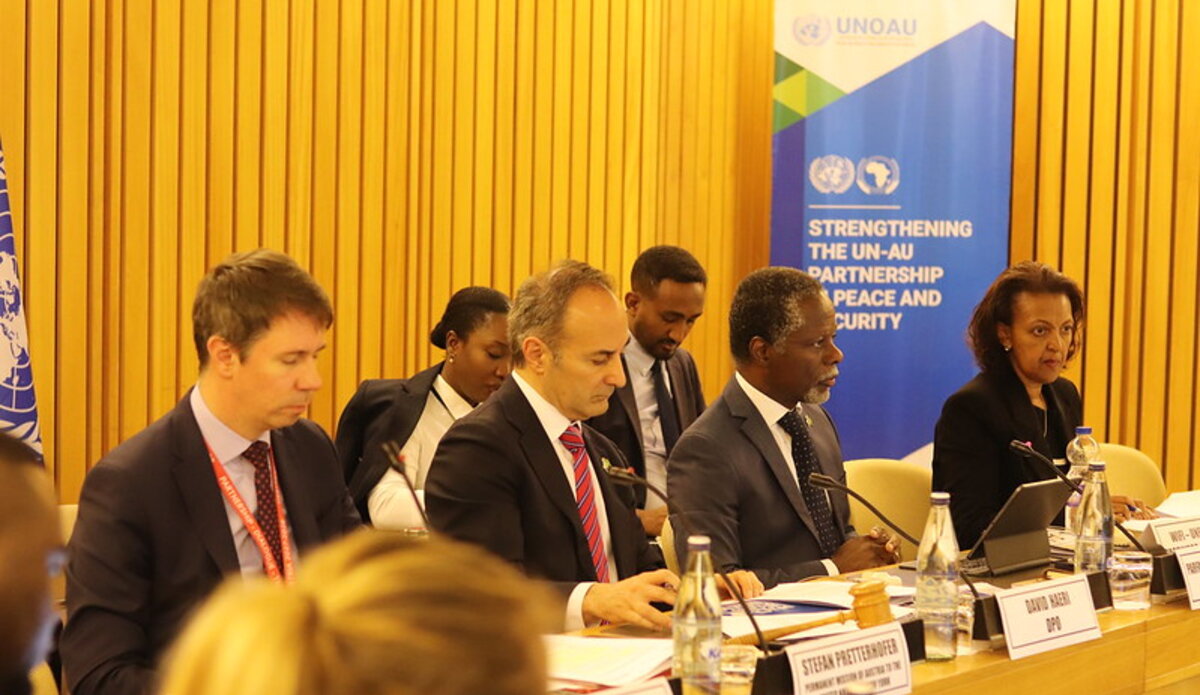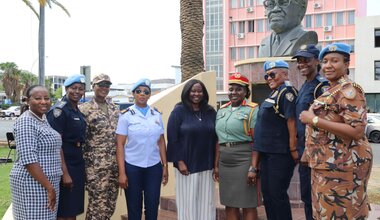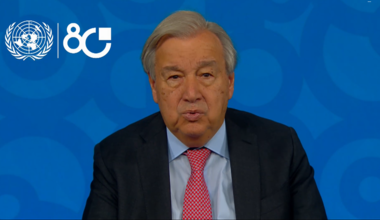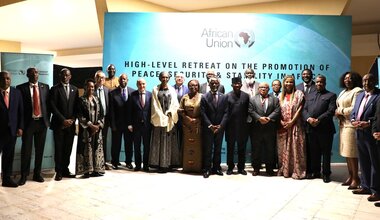SRSG Parfait Onanga-Anyanga's Opening Remarks at the Climate Security Mechanism Partnership Dialogue 2025
Excellencies,
Distinguished Members of the Group of Friends on Climate Security at the UN,
Ladies and Gentlemen,
It is my great honour to welcome you to the 2025 Climate Security Mechanism Partnership Dialogue here in Addis Ababa. I wish to thank the Climate Security Mechanism, the Group of Friends on Climate and Security, and all partners for working closely with UNOAU to make this timely and important Dialogue possible.
Across Africa, the impacts of climate change are increasingly shaping peace and security dynamics, acting as a conflict risk multiplier, deepening vulnerabilities, and placing additional stress on already fragile political, economic and social systems.
From the Sahel to the Horn, from low-lying island states to urban centres, climate shocks are eroding livelihoods, fuelling displacement, and straining governance. This situation is extremely serious, and calls for urgent and concerted action.
The risks are layered, interconnected, and dynamic, and they demand coordinated, sustained responses that transcend institutional and geographic silos. It is yet another paradox for the continent: Africa contributes the least to global emissions, yet bears the brunt of climate impacts.
Excellencies, Ladies and Gentlemen,
Today, we meet at a moment of renewed momentum. The African Union is advancing a Common African Position on Climate, Peace and Security, an ambitious and unprecedented effort to deliver context-specific responses to climate-related peace and security risks at national, regional, and continental levels.
This process, driven by AU Member States, reflects Africa’s determination to frame climate action as both a peacebuilding imperative and a pathway to resilience. The partnership between the United Nations and the African Union has never been stronger. The two organizations work more closely together across the three pillars of peace and security; sustainable development; and human rights, ensuring that our collective efforts are well coordinated and mutually reinforcing.
UNOAU, with the support of DPPA and the Climate Security Mechanism, is honoured to have accompanied this process. We are especially grateful to partners who have contributed to this journey, including, importantly, Switzerland, Germany, Ireland, the United Kingdom, Denmark, GiZ, UNECA, and UNDP, as well as AU-affiliated think tanks and Centres of Excellence—all of whom remain committed to advancing African-led responses to the climate, peace and security agenda.
I would also like to recognize the leadership of the African Union Commission, particularly the Department of Political Affairs, Peace, and Security and the Department of Agriculture, Rural Development, Blue Economy and Sustainable Environment, for jointly advancing this agenda. Their commitment to interdepartmental coordination on climate, peace, and security, including through the AU’s Climate Security Cluster, demonstrates growing institutional coherence and a shared understanding of the complex nature of these risks.
Excellencies, Ladies and Gentlemen,
This Dialogue is not only a moment to take stock of challenges, it is also a platform to spotlight innovation, good practices, and emerging partnerships. Whether it is early warning systems in the Horn of Africa, integrated risk assessments in the Sahel, or conflict-sensitive climate finance in Somalia: progress is being made, though admittedly not a pace that is commensurate with the unfolding emergencies.
Climate action is a priority for the African Union, and the United Nations is fully aligned, as demonstrated by the work of the UN Climate Security Mechanism, and its growing network of Climate, Peace, and Security Advisors across Africa.
As the Secretary-General stated at the AU Summit in February: “Climate disasters are tearing across Africa, destroying lives, upending livelihoods, devastating economies, and inflaming conflict. At the same time, the renewables revolution is unstoppable, and creating huge opportunities.”
This is a call to action, both to address climate-related security risks, and to seize the opportunities that climate adaptation and mitigation offer as pathways to peace and sustainable development. In this spirit, I am pleased to share that tomorrow, with the support of Switzerland and in collaboration with the UN Climate Security Mechanism, UNOAU will host the inaugural Africa Climate, Peace, and Security Advisors and Experts Strategic Coordination Workshop. This two-day convening will bring together UN Climate, Peace, and Security Advisors from across the continent, alongside continental and regional technical experts, to advance shared analysis and coordinated action.
These back-to-back events could not be more timely. Later this year, in September, Africa will convene its second Africa Climate Summit, with Ethiopia as the host country. This will be a critical opportunity to elevate climate, peace, and security on the continental agenda, as Africa takes stock of the Africa Climate Change and Resilient Development Strategy and the Nairobi Declaration—both of which recognise the climate, peace, and security nexus.
Excellencies, Ladies and Gentlemen,
The stakes could not be higher. Now is the time for coherence, coordination, and unity of purpose. Let us reaffirm our shared resolve to act across mandates, across institutions, and in full alignment with African priorities.
UNOAU will remain fully committed to this effort, in service of a more peaceful, resilient, and climate-secure Africa.
I thank you and wish you a productive Dialogue.
 UN
UN






